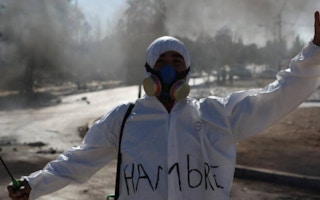Economic shocks caused by the new coronavirus are set to fuel poverty, unrest and instability in heavily-indebted and politically fragile countries for years to come, found an international think-tank on Wednesday.
The pandemic’s impacts will undo years of socio-economic development for some countries, the Institute for Economics and Peace (IEP) said in a briefing released alongside its annual index measuring peace levels around the world.
“The worst is still to come,” said Steve Killelea, head of the Australia-based IEP, which expects to see most of the peace indicators it measures fall for several years.
“The countries which are going to suffer the most are those which are currently fragile because they are the ones which generally have higher levels of food insecurity, the governments are politically less stable and economies are less robust.”
Lockdowns to prevent the spread of the virus have hit economies, with the International Labour Organization estimating some 200 million would lose their jobs and the World Bank predicting the global economy will shrink by 5 per cent in 2020.
Analysts predict it will take five years for world economies to recover back to their 2019 levels, said Killelea.
Heavily-indebted countries may struggle to find cash to rebuild their economies after the coronavirus, increasing instability, riots and violence, IEP’s analysis found.
“
The countries which are going to suffer the most are those which are currently fragile because they are the ones which generally have higher levels of food insecurity, the governments are politically less stable and economies are less robust.
Steve Killelea, chairman, Institute for Economics and Peace
Many states are also likely to cut overseas aid which will further stress fragile and conflict-torn countries, such as Liberia, Afghanistan, Burundi and South Sudan, and risks worsening humanitarian crises, it said.
Climate change and natural disasters also pose a growing threat to peace, said the IEP, which found global peacefulness has deteriorated worldwide over the past year.
Global peacefulness has declined 2.5 per cent since 2008, found the index, which gives countries a peace score of between 1 and 5, based on 23 indicators measuring levels of conflicts, societal safety and militarisation.
Vidya Diwakar, a researcher at the Overseas Development Institute think-tank, predicted the impact of the pandemic would be felt beyond fragile states, driving poverty and hunger, which can trigger unrest, in many countries. “With such a crisis of this sort which affects so many dimensions … there are likely to be long-term impacts,” she told the Thomson Reuters Foundation from London.
This story was published with permission from Thomson Reuters Foundation, the charitable arm of Thomson Reuters, that covers humanitarian news, climate change, resilience, women’s rights, trafficking and property rights. Visit http://news.trust.org/climate.










